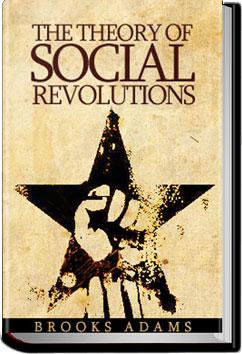UNLIMITED Audiobooks and eBooks
Over 40,000 books & works on all major devices
Get ALL YOU CAN for FREE for 30 days!
The Theory of Social Revolutions
Brooks Adams
Book Overview:
Brooks Adams was an American historian and a critic of capitalism. He believed that commercial civilizations rise and fall in predictable cycles. First, masses of people draw together in large population centers and engage in commercial activities. As their desire for wealth grows, they discard spiritual and creative values. Their greed leads to distrust and dishonesty, and eventually the society crumbles. In The Law of Civilization and Decay, Adams noted that as new population centers emerged in the west, centers of world trade shifted from Constantinople to Venice to Amsterdam to London.
Brooks Adams was an American historian and a critic of capitalism. He believed that commercial civilizations rise and fall in predictable cycles. First, masses of people draw together in large population centers and engage in commercial activities. As their desire for wealth grows, they discard spiritual and creative values. Their greed leads to distrust and dishonesty, and eventually the society crumbles. In The Law of Civilization and Decay, Adams noted that as new population centers emerged in the west, centers of world trade shifted from Constantinople to Venice to Amsterdam to London.
How does All You Can Books work?
All You Can Books gives you UNLIMITED access to over 40,000 Audiobooks, eBooks, and Foreign Language courses. Download as many audiobooks, ebooks, language audio courses, and language e-workbooks as you want during the FREE trial and it's all yours to keep even if you cancel during the FREE trial. The service works on any major device including computers, smartphones, music players, e-readers, and tablets. You can try the service for FREE for 30 days then it's just $19.99 per month after that. So for the price everyone else charges for just 1 book, we offer you UNLIMITED audio books, e-books and language courses to download and enjoy as you please. No restrictions.
The abstract virtue of the written Constitution was not, however, a question in issue when Washington and his contemporaries set themselves to reorganize the Confederation. Those men had no choice but to draft some kind of a platform on which the states could agree to unite, if they were to unite peacefully at all, and accordingly the. . . Read More
Try now for FREE!

"Love your service - thanks so much for what you do!"
- Customer Cathryn Mazer
"I did not realize that you would have so many audio books I would enjoy"
- Customer Sharon Morrison
"For all my fellow Audio Book & E-Book regulars:
This is about as close to nirvana as I have found!"
- Twitter post from @bobbyekat



Community Reviews
interesting more by historical comparison than by its own merit.
This book may have been revolutionary when it was first written but it just doesn't hold up. The author's take on history from his era was interesting but misses the mark quite a bit.
Interesting for historical reasons, a treatise on the making of American democracy and the many questions and dilemmas that we still grapple with today. However, much of the content is outdated and reads like a pamphlet. The theory that societal change can only be brought about through revolutions h
This book really resonated with me. The similarities in the last chapter Inferences to today's politics, and the mindset of the current president is uncanny in every sense of the word. The electoral college elected The Capitalist.
A warning to anyone considering this book: don't: It's just too out-of-date. I read 20 pages or so and just realized it was pointless
You would have to be a specialist historian or rather "historisist" investigating past theories to get anything out of this book.
for my duty